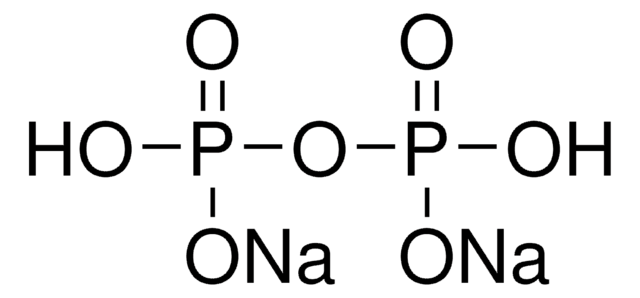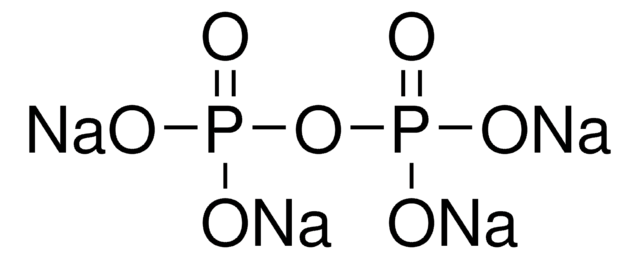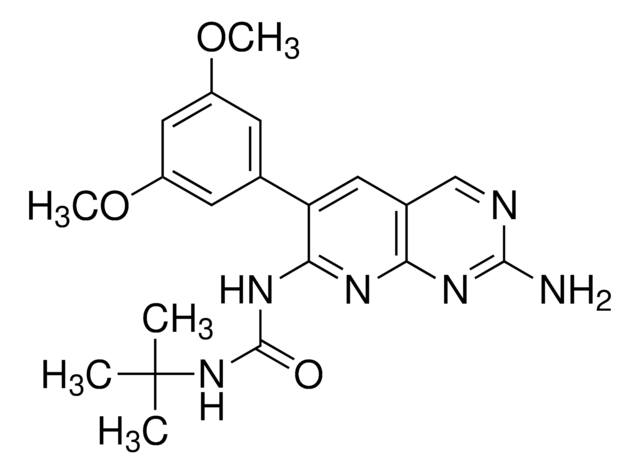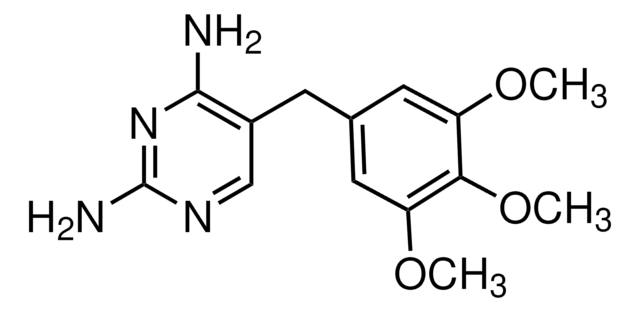S9007
Spectinomycin dihydrochloride pentahydrate
potency: ≥603 μg per mg
Synonym(s):
Actinospectacin, Actinospectacin dihydrochloride pentahydrate, Spectinomycin, Spectinomycin HCL, Spectinomycin Hydrochloride, Spectinomycin hydrochloride
About This Item
Recommended Products
biological source
synthetic (inorganic)
Quality Level
form
powder
potency
≥603 μg per mg
storage condition
(Keep container tightly closed in a dry and well-ventilated place.)
color
white to pale buff
solubility
H2O: soluble 50 mg/mL
antibiotic activity spectrum
Gram-negative bacteria
Gram-positive bacteria
application(s)
agriculture
Mode of action
protein synthesis | interferes
storage temp.
2-8°C
SMILES string
O.O.O.O.O.Cl.Cl.CN[C@@H]1[C@H](O)[C@H](NC)[C@H]2O[C@]3(O)[C@@H](O[C@H](C)CC3=O)O[C@@H]2[C@H]1O
InChI
1S/C14H24N2O7.2ClH.5H2O/c1-5-4-6(17)14(20)13(21-5)22-12-10(19)7(15-2)9(18)8(16-3)11(12)23-14;;;;;;;/h5,7-13,15-16,18-20H,4H2,1-3H3;2*1H;5*1H2/t5-,7-,8+,9+,10+,11-,12-,13+,14+;;;;;;;/m1......./s1
InChI key
DCHJOVNPPSBWHK-UXXUFHFZSA-N
Looking for similar products? Visit Product Comparison Guide
General description
Application
Biochem/physiol Actions
Mode of Resistance: A mutation in rpsE, the gene for ribosomal protein S5, prevents the binding of spectinomycin. Resistance is also conferred by the aminoglycoside-3′-adenyltransferase gene (aadA).
Antimicrobial spectrum: Spectinomycin acts against gram-negative and gram-positive bacteria.
Caution
Preparation Note
Other Notes
Signal Word
Warning
Hazard Statements
Precautionary Statements
Hazard Classifications
Eye Irrit. 2 - Skin Irrit. 2 - STOT SE 3
Target Organs
Respiratory system
Storage Class Code
11 - Combustible Solids
WGK
WGK 2
Flash Point(F)
Not applicable
Flash Point(C)
Not applicable
Personal Protective Equipment
Regulatory Listings
Regulatory Listings are mainly provided for chemical products. Only limited information can be provided here for non-chemical products. No entry means none of the components are listed. It is the user’s obligation to ensure the safe and legal use of the product.
JAN Code
S9007-5G-9:
S9007-25G:
S9007-BULK-9:
S9007-VAR:
S9007-VAR-9:
S9007-BULK:
S9007-1G:
S9007-5G:
Choose from one of the most recent versions:
Already Own This Product?
Find documentation for the products that you have recently purchased in the Document Library.
Customers Also Viewed
Our team of scientists has experience in all areas of research including Life Science, Material Science, Chemical Synthesis, Chromatography, Analytical and many others.
Contact Technical Service












